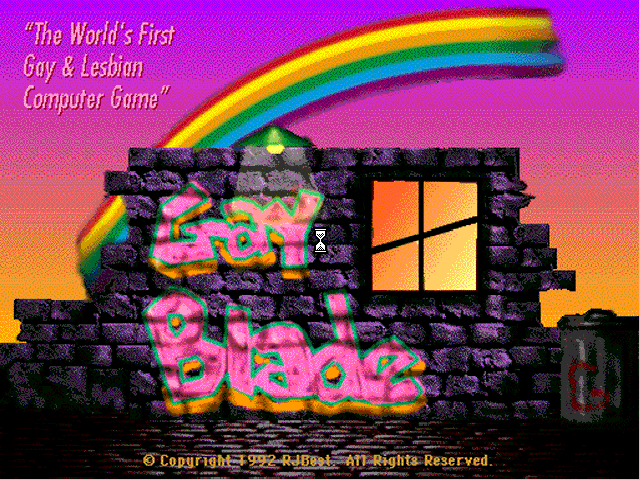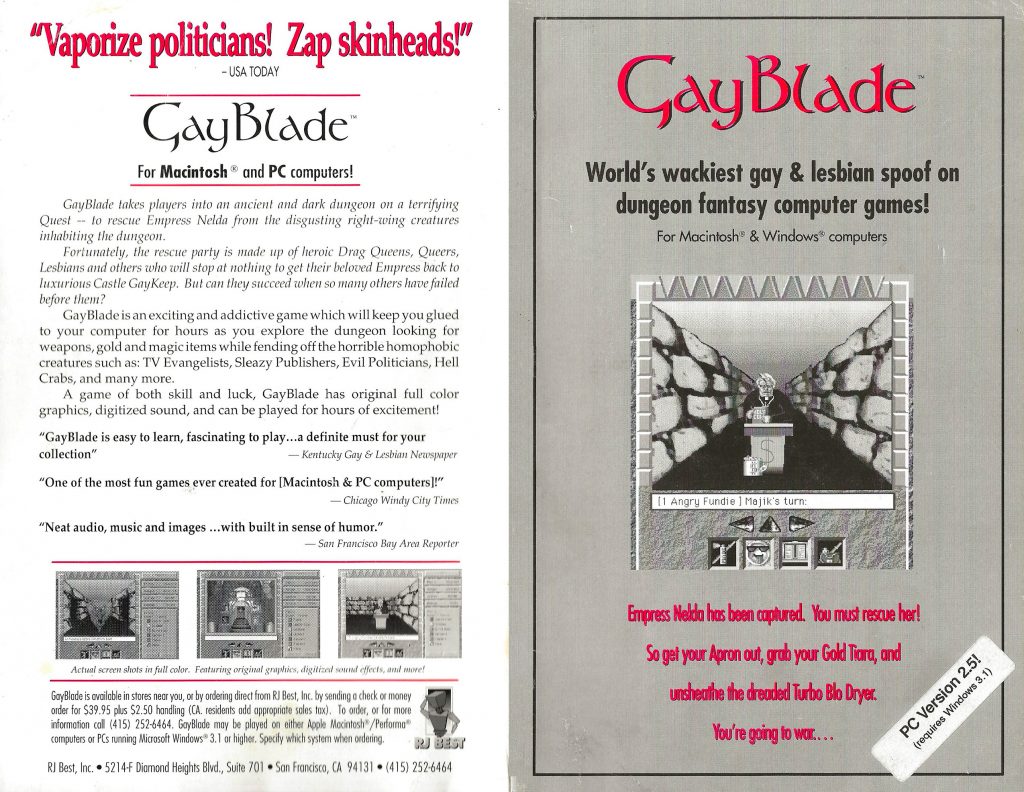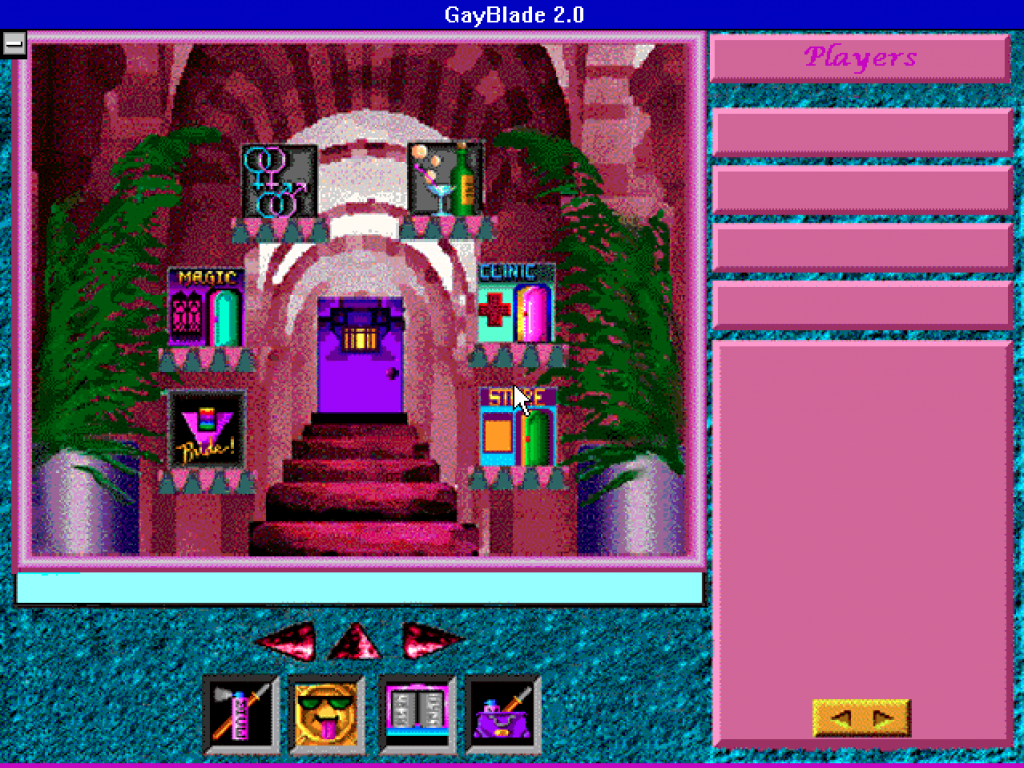
The recently released video game documentary High Score includes a sequence in the third episode about a game called GayBlade. GayBlade is one of the first commercially-sold LGTBQ-themed video games, a role-playing romp for Windows and Macintosh occasionally referred to as “Dungeons and Drag Queens”. Once thought to have been lost, the game’s software was recently discovered and preserved—and is now available in the Internet Archive!
Although LGTBQ people have been creating video games since the earliest days of the industry, there were very few games before the 21st century that explicitly had LGTBQ themes. Game creator Ryan Best hoped to change that with GayBlade, remarking, “This game gives lesbians and gays—and straight people—a chance to strike back at homophobia from behind our computer screen.”

The game is definitely political, racy and unafraid to make waves, as it definitely did in 1992 when it was released. Players are tasked with exploring a deep dungeon filled with homophobic enemies, trying to rescue the Empress Nelda and return her to Castle GayKeep. Best (and co-creator John Theurer) filled the game with humorous spells, items and antagonists while still keeping it all within the traditional role-playing genre. There are over 13 levels and 1,300 different rooms in this dungeon, reflecting the remarkable amount of work put into it by its creators—truly a unique work of art.
After being lost in a move from Honolulu to San Francisco, the game was thought to have disappeared forever. In High Score, creator Ryan Best laments that he was unable to find any of the game files, and was not very hopeful he would ever find them. But that’s not the end of the story—between the close of filming and the release of the documentary, Best discovered another copy of his game. Thanks to efforts by the LGTBQ Game Archive, Strong Museum of Play, and Internet Archive, it was preserved.

If you want to experience GayBlade for yourself, it’s available in our emulated games collection. You can play it directly in your browser if you’d like, or download the original source code. Additionally, an even earlier LGTBQ game called Caper In The Castro, a mystery adventure dating to 1989, is also emulated in the archive. So hit play and take a look at a little-known slice of LGTBQ history!
Has a very captived market
This is a wonderful story of the Archive bringing things thought to be lost back to life!!!
One thing to say though, is that perhaps you should be careful to have an accurate historical record? Queer theory did not exist until ~mid 1990s, so perhaps none of these games are LGBTQIA+ — they’re Gay and Lesbian works. Especially Caper In The Castro. And don’t get me wrong, I don’t say that with a mean spirit, it’s just a comment to point this out in all honesty. Even the game copy/descriptions provided refer to them being Gay and Lesbian works. They should be celebrated for what they are, and an archive shouldn’t rewrite the past.
Other than that, love it! xoxo
What we now call queer existed before Queer Theory (and isn’t part of Queer Theory looking at historical queerness?). It’s possible the games were meant as specifically Gay and Lesbian works, but I think the more likely thing is that they were referred to as that because we weren’t using LGBTQIA+ terms yet. It’s not rewriting the past, it’s talking about the past using modern terminology. Unless the creators say we shouldn’t, I think it’s fair to refer to these as LGTBQ games.
I had heard that the integrity of this archive was in the process of being compromised/subverted and your very good point about rewriting the past looks likely to be repeated by others as time goes on.
Every time I look up and see our acronym… There’s new letters! Geeze… I can’t keep up! On top of that I am half black… Between all the name changes in my race, my sexuality support group, my sexual preference, and my gender… I can’t cement myself into anything! Dang! What is after the Q now?? Please? 2 more letters. What do they stand for now? *sighs* . I see why Prince gave up his name. I think I will do something similar. Whenever people want to know any of that information… This will be my new answer! What’s my race? . What’s my gender? . What is my sex? . Nationality? . Yeaaah!!! See? Nice and simple!! Yay!!!
> Even the game copy/descriptions provided refer to them being Gay and Lesbian works.
CitC, sure, but GayBlade’s description explicitly mentions drag queens and queers as part of the supporting cast. That should bestow it the *TQ qualifier at least.
Eve Kosofsky Sedgwick writes about “queer studies,” apparently meaning what is now meant by “queer theory,” in Epistemology of the Closet (1990), referring to her own book Between Men (1985)
The ad copy for GayBlade that is posted right there literally says it’s about “heroic Drag Queens, Queers, Lesbians, and others.” In the 90s there were people identifying as queer proudly. We ARE celebrating it for what it is by including it in queer history – the “queer” and “others” represented in the Q+ is right there in the description.
If you’re interested, I have the full “Player’s Survival Guide” (20 pgs.), Quick Reference Card, a little yellow “Thank you for your order!” slip, and original purchase invoice. Oh, and the Mac version on two HD floppies.
Please feel free to reach of if you’re interested in these materials for the archive.
Anything that isn’t on the Archive would be great. Please, feel free to upload those!
RH Can you scan all those and upload them to the archive????
I was just surfing thru IA , and saw this. Everyone would like those in the IA! My…non-cisgender (!?) friends would love it!
Thank you <3
Just watched that episode last night. Happy for the creator that it was found. Crazy that the shipping company never picked up his stuff all those years back.
Why describe this game as “LGBTQ” when the game itself is clearly billed as a “Gay & Lesbian Computer Game?” “LGBTQ” was confined to fringe circles as recently as five years ago; even “LGBT” is a product of the 1990s. “LGBTQ,” like the equally laughable “Latinx” for Hispanics, is not even used by most of the very people it purports to describe.
Most of the people I know use LGBT or LGBTQ. There could be a generational and/or geographical difference. For instance, where I am in the Pacific Northwest, “queer” is often used to describe the community. In other places, queer is considered a rude term.
-A gay/bi/whatever individual
I loathe the word “queer.”
It’s poison. Pouring poison into a tabletop sugar container can’t magically make poison healthy, never mind palatable.
LGBT people who identify as “queer” or “Q” imagine that by nabbing the word (or letter) from bigots they can repurpose a vile, dehumanizing aspersion into an identity of self-empowerment.
I find this rationale lacking on many fronts.
The more people brand themselves as “queer,” the more straight allies question what the hell gays are thinking. Straight people who aren’t blinded by their own magni8fence know exactly how “queer” was (and is) used in a sentence. “Queer” is an insult’s insult. It’s never been a term of endearment. The word delivers, as intended, stigma, exclusion, isolation, loneliness, regret, shame, pathology, criminality, and loathing.
Straight friends and allies aren’t quite sure what to do with “queer.” Is it not offensive when “queers” say “queer” but a taboo for straight people?
One thing’s for sure. Bigots hear gays et al. using “queer,” and bigots who had hesitated to say the word due to explicit or implicit pressure from others feel liberated. “Hell, those queers are so toxic to society they actually named adopted their perversion as a label. If they say they’re ‘queers,’ why can’t I?”
How can “queers” know whether people are friend or foe when they say “queer”? Why is it not alarming to “queers” that people continue to use the word as a cruel denigration?
And one more question: if someone is L, G, B, and/or T, why is “queer” not redundant? How is “Q” distinct from the other letters in the initialism? Are there straight queers?
I am the developer / author of the Windows version and still have unopened copies
Text uses “LGTBQ” throughout, instead of “LGBTQ.” Maybe this is a stylistic choice, but the link labelled “LGTBQ Game Archive” actually points to a URL which specifically uses LGBTQ.
This is great. I can say that technology has many positive uses This is one of the most important of them
Wow. An amazing and valuable piece of history is recovered and everybody argues semantics, instead of just celebrating the win! Besides, I prefer to think of those of us in the so-called LGBTQ (add further letters of your choice) community as people instead of labels. But that’s just me of course. 😉
Very interesting, i love these type of posts, thanks for posting
How great Is it possible to upload them all in the archive?
Thank god it is now preserved. Thanks to @sketch_the_cow for the upload.